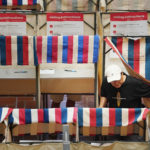Denby Fawcett: Honolulu Needs More Help Evicting Illegal Businesses From Parks
The city's parks department is trying new strategies to keep parks free of commercial activity, but it doesn't have enough manpower or authority to make a real difference.
July 9, 2024 · 8 min read

About the Author
Denby Fawcett is a longtime Hawaii television and newspaper journalist, who grew up in Honolulu. Her book, Secrets of Diamond Head: A History and Trail Guide is available on Amazon. Opinions are the author’s own and do not necessarily reflect Civil Beat’s views.
The city’s parks department is trying new strategies to keep parks free of commercial activity, but it doesn’t have enough manpower or authority to make a real difference.
Surf schools and other businesses such as yoga and exercise studios continue to operate illegally in Kapiolani Park and other city parks on Oahu with impunity because they know they can.
Honolulu Police Department’s enforcement is spotty and ineffective. The fines for operating without necessary commercial permits are small in comparison to the money the businesses can make from serving tourists.
I wrote about this type of abuse almost three years ago. All that’s changed since then is that it’s worse today, especially in Kapiolani and Ala Moana Beach Parks.
“Basically, the businesses have taken over. They don’t care because there is no enforcement. They used to do their business out of their vans but now they are openly setting up tents in the park and leaving their surfboards and equipment on the grass,” Alethea Rebman said.
Rebman is president of the Kapiolani Park Preservation Society, a nonprofit watchdog group whose mission is to preserve the terms of the Kapiolani Park Trust — to keep the park free and open to the public forever.
I wish Honolulu County could be more like San Diego, which in May kicked out all the yoga schools operating in its parks without permits. The yogis are protesting with a lawsuit.
San Diego has park rangers with enforcement powers and clear laws prohibiting people without permits from selling goods and services and conducting classes in the parks even when they pretend their customers are paying with voluntary donations.

Honolulu’s Department of Parks and Recreation is looking to the day in the future when it might have its own full-time park rangers. For now, it has five temporary contract workers engaged in a two-year pilot project that began in September 2022. Their job is to develop additional ways to bring people into compliance with laws and rules that prohibit commercial activities in parks.
Parks Director Laura Thielen said the contract workers have collected information at all of Oahu’s parks and are in the process of creating brochures to pass out to violators.
Thielen says the information the rangers have gathered on the numbers and types of illegal businesses will give her strong footing when she presents a report to the city later this year.
A previous effort by the Blangiardi administration to get a new law to better regulate illegal commercial activities stalled last year. So an existing 32-year-old law remains the city’s key legal hammer to ban commercial activities at specific beach right-of-ways and parks including Queen’s Beach, where many of the companies continue to illegally operate freely today.
The law — which was written before the internet made it easier for unauthorized businesses to charge customers without being seen — clearly names the parks where commercial activities are prohibited. But Thielen says with PayPal and other apps it is difficult for the city to find exactly where the money was collected, from whom and for what services.
Hogging Valuable Park Space
Going after the illegal businesses might seem extreme but on the July 4 holiday, I was reminded of how this abuse impacts many residents trying to enjoy Oahu’s already crowded public parks — especially the beautiful oceanfront parks.
With parkgoers clamoring for parking places to unload their picnics on Independence Day, I saw a company called the Ohana Surf Project conduct its unpermitted business out of two vans and a bus —three vehicles hogging free oceanside public parking spaces on Kalakaua Avenue.
Businesses operating in all Oahu parks must have city permits that they must be ready to show when asked. And if they are conducting commercial operations in the ocean, including surfing lessons, they need a commercial use permit from the Department of Land and Natural Resources Division of Boating and Ocean Recreation.
Ohana Surf Project commandeered the two-hour parking spaces all day. Over the years, I have watched the company monopolize free public parking at the same place every day and brazenly take up recreational space in the park with its company tent on the lawn fronting Queen’s Beach.

In a text, Ohana Surf Project owner Sean Anderson said he has all the permits he is required to have although did not immediately respond to a request from Civil Beat to email a copy of his city permit to operate in Kapiolani Park.
No such permit exists because the city does not allow surf instruction in Kapiolani Park and does not issue permits to do businesses in the park except for one time events such as fairs and festivals.
“We have a shop nearby in the Marriott where we sign up lessons and have our base of operations. We do not and no one is allowed to solicit lessons, take payment for lessons rentals teach lessons in the park. It is our policy to adhere to these and every rule and regulation that governs our activity,” he wrote.
He said his students and workers use the park only before and after lessons.
Yet the company’s operations take up a lot of park space. Surfboards are laid out on the park lawn for lessons and the company’s tent is regularly erected on park grounds. And Ohana Surf Project operates out of three commercial vehicles parked semi-permanently, all day in spaces meant for the public.
Anderson addressed the parking issue in another email: “The two parking spots we utilize on a typical daily basis make no actual or practical difference to the parking situation in the park in that there would be no noticeable difference in time spent looking for a parking space in their absence.”
To be fair, Ohana Surf Project is only one of more than 30 businesses that park protection advocates say are continuing to operate illegally at different times in Kapiolani Park.
Hawaii Surfing Academy has plopped its photographer’s stand on the Queen’s Beach walkway with a sign to warn passersby “Do Not Disturb.” The photographer told me she does not need a permit to take photos that are included as part of the surf school’s lesson package.
Other businesses do outrageous things, such as yoga studios that list sections of Kapiolani Park on their websites as their offices for commercial beach sunrise and sunset yoga classes.
More Enforcement Help Needed
Thielen’s plans for getting more illegal companies to obey city ordinances include creating partnerships with the State Department of Taxation and the Public Utilities Commission to make it increasingly difficult for illegal vendors to set up their businesses in the parks.
But such partnerships have not been established yet.
“We would like to establish them,” Thielen said. “But our program is new and it will need to get established and build the relationships necessary for its operation.”
The Public Utilities Commission regulates vehicles that carry property and passengers including tour buses.
In an email to Civil Beat, PUC spokesperson Deborah Kwan wrote that the PUC has the authority to cite certificated motor carriers that violate county rules prohibiting recreational stops at certain Oahu parks. And the PUC can revoke the carrier’s certificate if they persist in repeated violations.

But Kwan points out that because of a new state law, the PUC’s enforcement efforts in the future will be carried out by the State Department of Transportation.
The Tax Department did not immediately respond to my inquiry about whether the department is doing anything to ensure businesses operating in parks without permits are paying taxes.
Thielen says she also is looking at legislation some cities on the mainland are exploring to stop illegal vacation rentals and she wonders if such proposals could be applied to go after illegal businesses operating in Oahu parks that advertise online to attract customers.
“At least one district ruled that online vacation rental companies could not claim rights to free speech because commercial speech is not a protected category,” she said.
At any rate, if you are frustrated by watching illegal commercial activity in parks, you are going to have to wait longer for the city to stop it.
“Please understand at this point we have five one-year renewable contract workers and no authority to take enforcement activity, no equipment and no communications for police backup,” Thielen said.
And that is to oversee 300 parks that are open 365 days a year.
Despite criticism that its enforcement against such activities is inconsistent, Honolulu Police Department says it responds regularly to public complaints about unauthorized commercial activity.
In an email, HPD Acting Capt. Blake Arita of the Waikiki District says it is working to stop violations with educational outreach and a combination of uniformed and undercover operations.
 Sign up for our FREE morning newsletter and face each day more informed.
Sign up for our FREE morning newsletter and face each day more informed.
Read this next:
Why Dignity Matters When Deciding Who To Vote For
By Carlino Giampolo · July 10, 2024 · 3 min read
Local reporting when you need it most
Support timely, accurate, independent journalism.
Honolulu Civil Beat is a nonprofit organization, and your donation helps us produce local reporting that serves all of Hawaii.
ContributeAbout the Author
Denby Fawcett is a longtime Hawaii television and newspaper journalist, who grew up in Honolulu. Her book, Secrets of Diamond Head: A History and Trail Guide is available on Amazon. Opinions are the author’s own and do not necessarily reflect Civil Beat’s views.
Latest Comments (0)
If no money for Parks enforcement, City should forget about building that fancy, unnecessary 18 story pedestrian bridge across the Ala Wai to the tune of estimated $65m+ (plus $25m from feds) to be paid by taxpayers! City's complete streets is roaring ahead with this without an EIS. There is a meeting scheduled July 19th but not many neighbors are aware. Need to speak up.
Concernedtaxpayer · 1 week ago
I sat on a bench and watched many seniors walking the paths at Ala Moana Beach park; many using walkers or canes. Then I observed two Segway groups on the path forcing the seniors off the path. -I walked to the Kewalo Basin end of Ala Moana park and saw surf schools monopolizing shoreline parking and I thought" why arenât these close shoreline parking spaces designated handicapped" ?
Swimmerjean · 1 week ago
I have a question: where can you take a surf lesson in Waikiki from one of the kamaaina beach boys? Is this new surf school the only option? Surf lessons make safer surfersâteaching the surf etiquette and respect for other surfers. I wouldnât want to ban all surf programs in Waikiki.
4Kaneohe · 1 week ago
About IDEAS
IDEAS is the place you'll find essays, analysis and opinion on every aspect of life and public affairs in Hawaii. We want to showcase smart ideas about the future of Hawaii, from the state's sharpest thinkers, to stretch our collective thinking about a problem or an issue. Email news@civilbeat.org to submit an idea.

